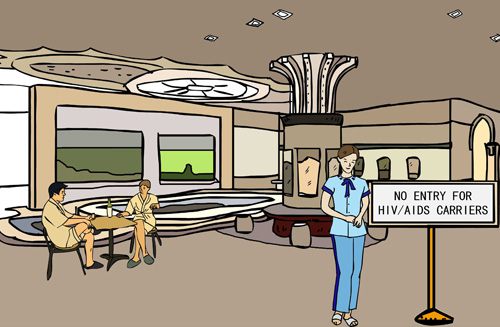|
 |
|
(LI SHIGONG) |
Recently, a draft regulation on the public bathing industry released by the Ministry of Commerce, which forbids people with HIV/AIDS to enter public bathhouses, has caused a stir.
The draft orders public bathhouses to display signs prohibiting "people with venereal diseases, AIDS and infectious skin diseases" to enter. It also stipulates that any public bathhouse that violates the regulation would be warned or fined by as much as 30,000 yuan ($4,911).
A survey conducted by Sina Weibo, China's version of Twitter, showed that more than 70 percent of respondents considered the ban necessary to ensure public health, with 20 percent opposed to the draft, claiming that it is unfair and might deepen social discrimination against HIV/AIDS carriers and add to public fear over the virus. The following are excerpts of opinions:
Supporter
Qiao Zhifeng (iqilu.com): Discrimination against and misconception of HIV/AIDS carriers and the disease itself is still widely evident across Chinese society. However, I believe that a regulation to forbid people with HIV/AIDS from entering public bathhouses protects health, instead of discriminating against such carriers.
To bathe with HIV/AIDS carriers is risky to some extent. Indeed, for many years, no epidemiological investigation shows that anyone has been infected by bathing in public bathhouses. However, this does not mean that the possibility does not exist and that such an incident would never occur. Intact skin will protect a person from the HIV virus, but what if someone happens to carry a small wound and meets with a HIV/AIDS carrier in some bathhouse? The odds of people catching HIV in a bathhouse are low, though they still exist. There are thus many reasons to take preventive measures against HIV/AIDS infection in bathhouses and similar venues.
At the same time, bathhouse operators doubt the feasibility of the ban. While it's possible for them to spot some kinds of dermatoses, it's impossible to find out whether certain customers carry venereal diseases or even HIV/AIDS. The regulation could only be followed-up via self-discipline. Bathhouse operators are not entitled to supervise patients or ask them for "health certificates."
But such a law is necessary. First, the law reminds bathhouses to guard against certain infectious diseases, and second, it serves as a warning to patients. It's illegal to deliberately infect others with venereal diseases. The new ban offers a kind of restriction to patient behavior.
Finally, I'd like to tell some activists that I understand their efforts to establish social equality and remove discrimination against HIV/AIDS carriers, but have they ever thought that excessive sensitivity implies a lack of confidence and a different type of discrimination against such patients? To face reality and show more tolerance will afford a better life to everyone.
| 